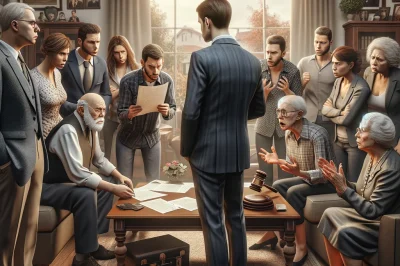Table of Contents

What happens in a situation where a Lasting Power of Attorney (LPA) has been taken out and other members of the family are opposed to it. Can relatives object to the appointment? If so, what are some of the grounds for objection?
If someone has been listed as a person to be notified they will receive a document from the Office of the Public Guardian informing them that the donor is planning to register the LPA and who the nominated attorneys will be. The person who has been notified then has the opportunity to object to the LPA. Their objection can be based on either ‘factual objection’ or ‘objection on prescribed grounds’.
Factual Objections
Someone can object based on factual objection if they have been listed as a person to be notified and if:
· The donor or an attorney has died
· The donor and the attorney were married or were in a civil partnership and have now divorced
· An attorney who has been chosen does not have mental capacity
· An attorney has chosen to stop acting as attorney
· The donor or an attorney has become bankrupt.
· In order to object based on factual objection, the person to be notified must object within 3 weeks of receiving the notification of registration.
Objecting on Prescribed Grounds
Someone can object based on prescribed grounds if the LPA has already been made and they believe:
· The LPA isn’t legally correct
· They don’t believe the donor had the mental capacity to make an LPA
· The donor cancelled their LPA when they regained capacity
· There was fraud, e.g., someone forged the donor’s signature
· The donor was pressured into making the LPA
· An attorney is acting against the donor’s best interests.
· In order to object based on prescribed grounds, the person notified must be able to provide evidence to support their objection.
Another final way to object to the LPA is if the donor believes that the attorney is unsuitable. In this situation the donor can complete a form to send to the Office of Public Guardian.
What Happens if Family Members are Opposed to an LPA
David Ford, Legal Associate at Swansea Legal Solutions explains:
“In my experience what does happen is that children often try to block parents taking out powers of attorney mainly because they don’t see the need and secondly due to the cost.
So it’s normally at an earlier stage that children get involved and, in the main, children do usually become the attorneys. They are the obvious choice to become an attorney as ideally you need to be younger (and ideally based locally). they need to be people that you trust which is why children would be ideal as attorneys.https://www.youtube.com/embed/oNHZHsDgeI0
Contact Swansea Legal Solutions
To find out more about the different LPA’s available, contact the team at Swansea Legal Solutions today on 01792 420844.
We offer office and home appointments (subject to T’s and C’s).






